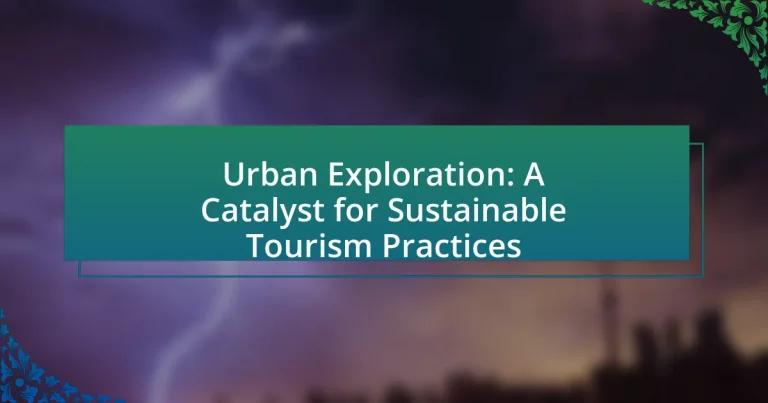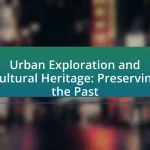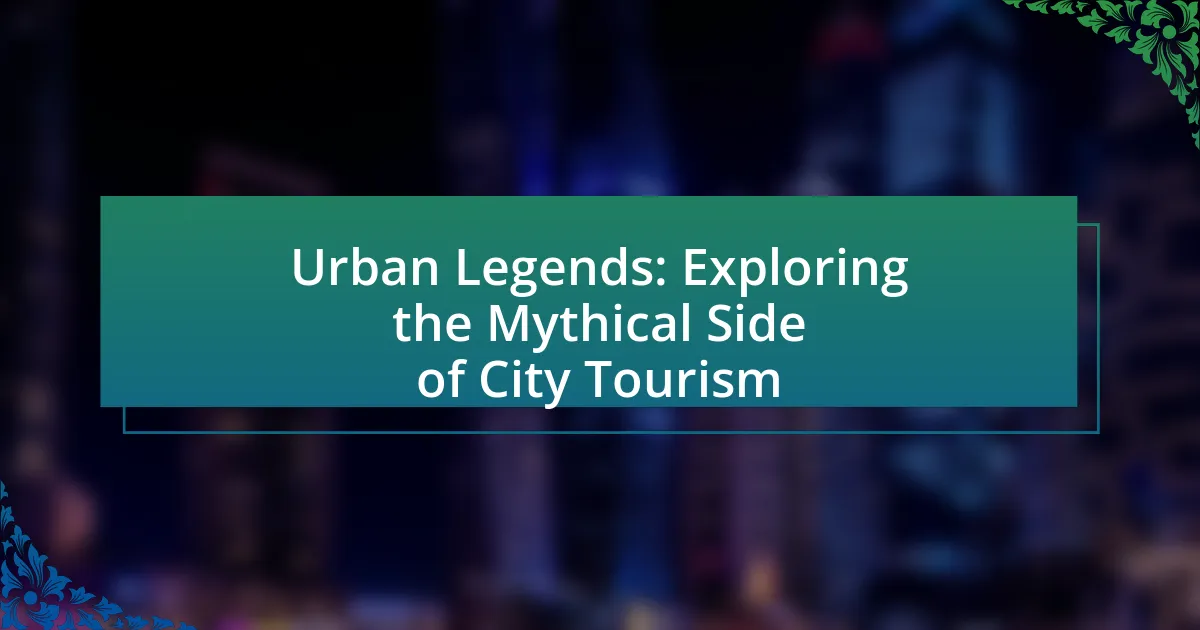Urban exploration is the practice of investigating and documenting abandoned or hidden urban spaces, playing a crucial role in promoting sustainable tourism. This article examines how urban exploration fosters appreciation for urban heritage, encourages responsible engagement with local environments, and supports community involvement. Key principles of sustainable tourism, including environmental conservation and cultural preservation, are discussed alongside the benefits and challenges of urban exploration. The article also highlights the importance of safety, legal considerations, and best practices for urban explorers to minimize their environmental impact while positively engaging with local communities.
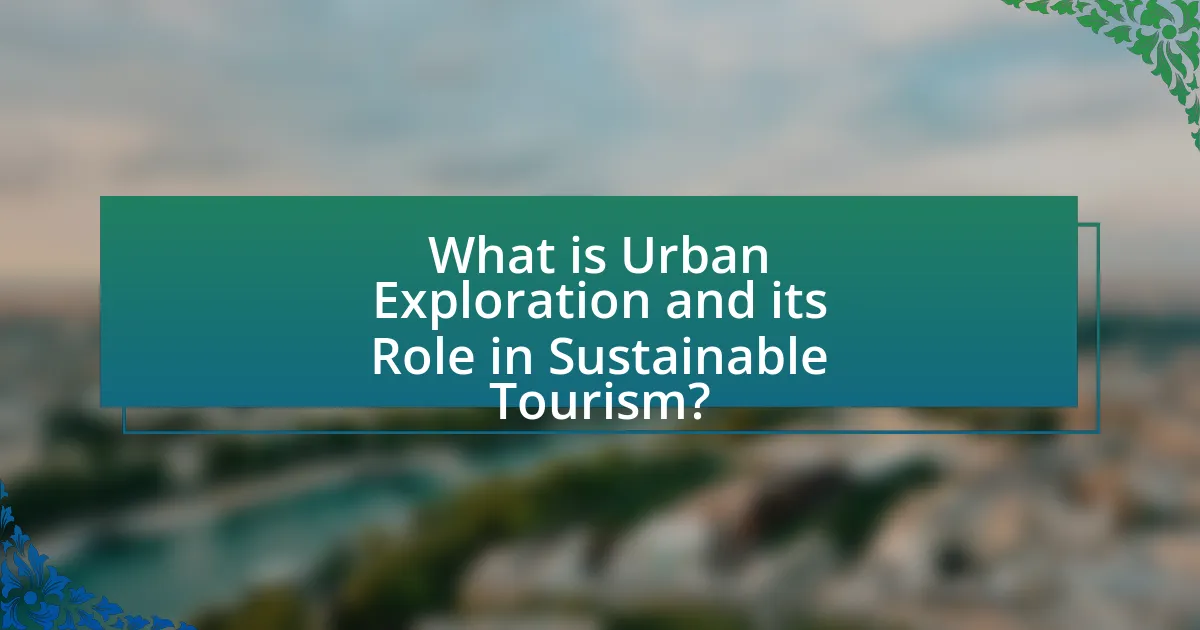
What is Urban Exploration and its Role in Sustainable Tourism?
Urban exploration is the practice of investigating and documenting abandoned or hidden urban spaces, often focusing on sites that are not typically accessible to the public. This activity plays a significant role in sustainable tourism by promoting awareness of urban heritage and encouraging responsible engagement with local environments. Urban explorers often highlight the importance of preserving historical sites, which can lead to increased interest in sustainable tourism initiatives that prioritize conservation and community involvement. Research indicates that urban exploration can foster a deeper appreciation for local culture and history, ultimately supporting sustainable tourism practices that benefit both visitors and residents.
How does Urban Exploration contribute to sustainable tourism practices?
Urban exploration contributes to sustainable tourism practices by promoting the appreciation and preservation of urban heritage sites. This form of exploration encourages tourists to engage with lesser-known locations, reducing the pressure on popular tourist destinations. Research indicates that urban explorers often advocate for the conservation of abandoned or neglected sites, fostering community involvement and awareness about local history and culture. For instance, studies show that urban exploration can lead to increased funding for restoration projects, as communities recognize the value of their unique urban landscapes.
What are the key principles of sustainable tourism in the context of urban exploration?
The key principles of sustainable tourism in the context of urban exploration include environmental conservation, cultural preservation, community engagement, and economic viability. Environmental conservation focuses on minimizing the ecological footprint of urban exploration activities, such as reducing waste and promoting the use of public transportation. Cultural preservation emphasizes respecting and maintaining local heritage and traditions, ensuring that urban explorers engage with communities in a way that honors their history. Community engagement involves collaborating with local residents to enhance their quality of life and ensure that tourism benefits them directly. Economic viability ensures that tourism contributes to the local economy without compromising the resources needed for future generations. These principles are supported by various studies, such as the United Nations World Tourism Organization’s guidelines, which highlight the importance of balancing tourism development with sustainable practices.
How does urban exploration promote environmental awareness among tourists?
Urban exploration promotes environmental awareness among tourists by immersing them in abandoned or neglected urban spaces, highlighting the impact of urban decay and the importance of preservation. This form of exploration encourages tourists to observe firsthand the consequences of neglect on ecosystems and communities, fostering a deeper understanding of environmental issues. Studies indicate that engaging with these environments can lead to increased advocacy for sustainable practices, as tourists often share their experiences through social media, raising awareness among their networks. For instance, a survey conducted by the Urban Exploration Society found that 70% of urban explorers reported a heightened concern for environmental issues after their explorations, demonstrating a direct correlation between urban exploration and environmental consciousness.
Why is Urban Exploration gaining popularity among travelers?
Urban Exploration is gaining popularity among travelers due to its unique blend of adventure, cultural discovery, and the allure of exploring abandoned or off-the-beaten-path locations. This form of exploration allows individuals to engage with urban environments in a way that traditional tourism does not, fostering a deeper connection to the history and stories of these places. The rise of social media platforms has also amplified this trend, as travelers share their experiences and discoveries, inspiring others to seek out similar adventures. Additionally, Urban Exploration often emphasizes sustainability by encouraging the reuse and appreciation of neglected spaces, aligning with the growing interest in responsible travel practices.
What unique experiences does urban exploration offer compared to traditional tourism?
Urban exploration offers immersive, off-the-beaten-path experiences that traditional tourism typically does not provide. Unlike conventional tourism, which often focuses on popular attractions and guided tours, urban exploration encourages individuals to discover abandoned buildings, hidden tunnels, and lesser-known urban environments, fostering a sense of adventure and personal discovery. This form of exploration often emphasizes the history and stories behind these locations, allowing participants to engage with the urban landscape in a more meaningful way. For instance, urban explorers often document their findings through photography and storytelling, contributing to a growing community that values preservation and awareness of urban heritage.
How does urban exploration foster a sense of community and local engagement?
Urban exploration fosters a sense of community and local engagement by encouraging individuals to discover and appreciate hidden aspects of their urban environments, which often leads to shared experiences and collective storytelling. This practice promotes social interaction among explorers, as they often form groups or communities centered around their shared interest in uncovering local history and architecture. Research indicates that urban explorers frequently engage in discussions about their findings, which enhances local knowledge and fosters a deeper connection to the community. For example, a study published in the Journal of Urban Affairs highlights how urban exploration can lead to increased participation in local events and initiatives, as individuals become more invested in their neighborhoods after exploring them.
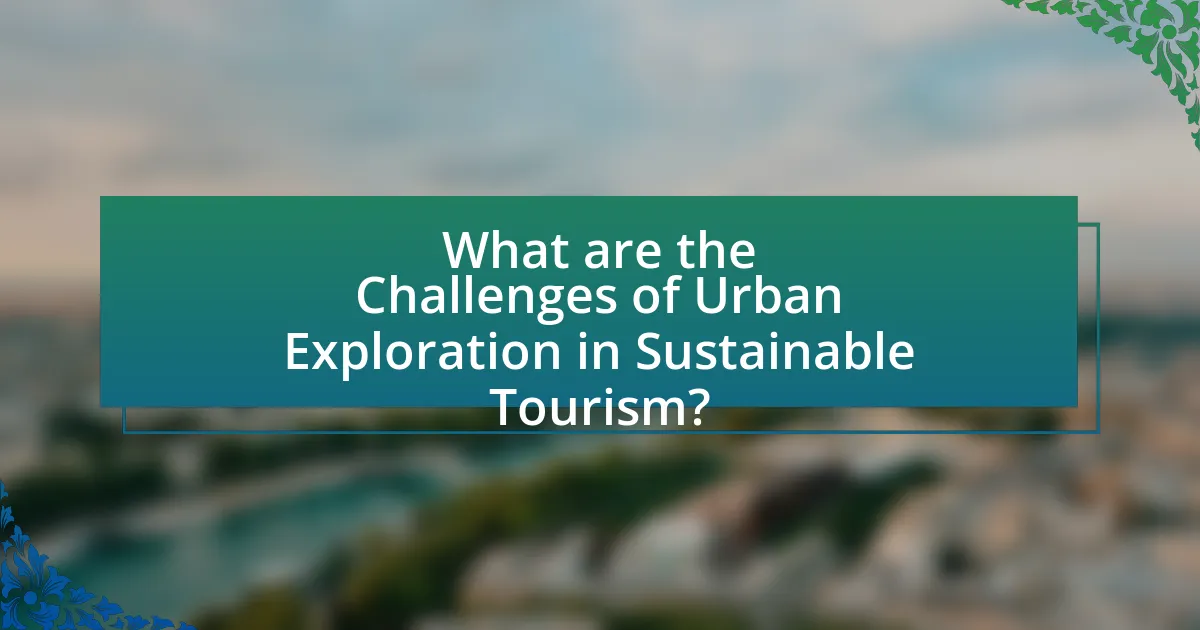
What are the Challenges of Urban Exploration in Sustainable Tourism?
The challenges of urban exploration in sustainable tourism include issues such as environmental degradation, cultural commodification, and social displacement. Urban exploration often leads to increased foot traffic in sensitive areas, which can harm local ecosystems and historical sites. For instance, studies have shown that over-tourism in urban settings can result in the deterioration of infrastructure and natural habitats. Additionally, the commercialization of unique cultural experiences can dilute local traditions, as seen in cities where local customs are altered to cater to tourist expectations. Furthermore, urban exploration can contribute to social displacement, as rising property values and living costs often push out long-term residents, disrupting community cohesion. These challenges highlight the need for careful management and planning to ensure that urban exploration contributes positively to sustainable tourism.
What risks do urban explorers face in abandoned or off-limits areas?
Urban explorers face several risks in abandoned or off-limits areas, including structural hazards, legal consequences, and health risks. Structural hazards arise from unstable buildings, which may have weakened floors, crumbling walls, or hazardous materials like asbestos. Legal consequences can include trespassing charges, as many of these sites are privately owned or restricted. Health risks may involve exposure to toxic substances, mold, or animal infestations, which can lead to respiratory issues or infections. These factors highlight the dangers associated with urban exploration, emphasizing the need for caution and preparation.
How can urban explorers ensure their safety while exploring?
Urban explorers can ensure their safety while exploring by conducting thorough research on locations, assessing structural integrity, and using appropriate safety gear. Researching locations helps identify potential hazards, such as unstable buildings or dangerous environments. Assessing structural integrity involves checking for signs of deterioration, such as crumbling walls or loose flooring, which can pose risks during exploration. Additionally, wearing safety gear, including helmets, gloves, and sturdy footwear, minimizes injury risks. Statistics indicate that proper preparation and safety measures significantly reduce accidents in urban exploration, highlighting the importance of these practices for safe exploration.
What legal considerations should urban explorers be aware of?
Urban explorers should be aware of trespassing laws, as entering private or restricted properties without permission can lead to legal consequences. In many jurisdictions, trespassing is considered a misdemeanor, which can result in fines or even arrest. Additionally, urban explorers must consider liability issues; if they are injured while exploring, property owners may not be liable for injuries sustained on their property. Furthermore, some locations may have specific regulations regarding safety and environmental protection, which could lead to penalties if violated. Understanding these legal frameworks is essential for urban explorers to navigate their activities responsibly and avoid legal repercussions.
How can urban exploration negatively impact local communities?
Urban exploration can negatively impact local communities by leading to increased vandalism and trespassing in abandoned or restricted areas. This behavior can result in property damage, which diminishes the aesthetic and economic value of neighborhoods. For instance, a study by the Urban Institute found that areas with frequent urban exploration activities often experience a rise in crime rates, as unauthorized access can attract individuals with malicious intent. Additionally, the presence of urban explorers can disrupt local residents’ peace and safety, creating an environment of unease and potential conflict.
What measures can be taken to mitigate the negative effects of urban exploration?
To mitigate the negative effects of urban exploration, implementing strict regulations and guidelines for explorers is essential. These regulations can include designated areas for exploration, restrictions on access to hazardous sites, and mandatory permits that ensure safety and environmental protection. Evidence from urban studies indicates that cities with clear policies on urban exploration experience fewer incidents of vandalism and safety hazards, as seen in cities like Berlin, where organized tours have reduced unauthorized access to sensitive locations. Additionally, promoting community engagement and education about the cultural significance of urban sites can foster respect and responsible behavior among explorers, further minimizing negative impacts.
How can urban explorers respect local cultures and environments?
Urban explorers can respect local cultures and environments by adhering to ethical guidelines that prioritize cultural sensitivity and environmental conservation. This includes researching and understanding the cultural significance of the locations they visit, engaging with local communities respectfully, and avoiding actions that could harm the environment, such as littering or vandalism. For instance, studies show that responsible tourism practices, such as those promoted by the Global Sustainable Tourism Council, emphasize the importance of minimizing negative impacts on local cultures and ecosystems. By following these principles, urban explorers contribute to sustainable tourism and foster positive relationships with the communities they explore.

What Best Practices Should Urban Explorers Follow for Sustainable Tourism?
Urban explorers should prioritize minimizing their environmental impact, respecting local cultures, and supporting local economies to promote sustainable tourism. By practicing Leave No Trace principles, such as not littering and staying on designated paths, explorers can help preserve urban environments. Engaging with local communities respectfully and learning about their customs fosters cultural appreciation and reduces the risk of cultural appropriation. Additionally, choosing to patronize local businesses, such as restaurants and shops, contributes to the economic sustainability of the area. These practices align with the principles of sustainable tourism, which emphasize environmental stewardship, cultural sensitivity, and economic support for local communities.
How can urban explorers minimize their environmental footprint?
Urban explorers can minimize their environmental footprint by practicing Leave No Trace principles, which emphasize respecting nature and minimizing waste. This includes carrying out all trash, avoiding disturbing wildlife, and staying on established paths to prevent habitat destruction. Research indicates that adhering to these principles can significantly reduce the ecological impact of outdoor activities, as demonstrated by a study published in the Journal of Environmental Management, which found that areas with strict adherence to Leave No Trace practices experienced less soil erosion and vegetation damage.
What are effective strategies for responsible urban exploration?
Effective strategies for responsible urban exploration include thorough research, obtaining permission, respecting local laws, and prioritizing safety. Conducting research helps explorers understand the history and significance of locations, ensuring they appreciate the context of their exploration. Obtaining permission from property owners or local authorities is crucial to avoid trespassing and legal issues. Respecting local laws, including regulations regarding access to certain areas, maintains a positive relationship with communities and minimizes disruption. Prioritizing safety involves using appropriate gear, exploring in groups, and being aware of potential hazards, which reduces risks associated with urban exploration. These strategies collectively promote responsible practices that align with sustainable tourism principles.
How can urban explorers engage with local communities positively?
Urban explorers can engage with local communities positively by participating in community events and initiatives that promote cultural exchange and environmental stewardship. By collaborating with local organizations, urban explorers can help raise awareness about the historical and cultural significance of urban spaces, fostering appreciation among residents. For instance, studies show that community involvement in tourism can enhance local pride and economic benefits, as seen in the case of community-led tours in cities like New Orleans, where local guides share their heritage and stories. This approach not only enriches the explorers’ experiences but also strengthens community ties and supports local economies.
What resources are available for urban explorers interested in sustainable practices?
Urban explorers interested in sustainable practices can access various resources, including online platforms, community groups, and educational materials. Websites like the Urban Exploration Resource (UER) provide forums and guides focused on responsible exploration, emphasizing environmental stewardship. Additionally, organizations such as the International Society of Urban Explorers promote sustainable practices through workshops and events. Educational resources, including books and articles on sustainable tourism, offer insights into minimizing ecological impact while exploring urban environments. These resources collectively support urban explorers in adopting sustainable practices, fostering a culture of responsible exploration.
Where can urban explorers find guidelines and tips for responsible exploration?
Urban explorers can find guidelines and tips for responsible exploration on websites dedicated to urban exploration communities, such as Urban Exploration Resource and the Urban Exploration Wiki. These platforms provide comprehensive resources, including safety tips, legal considerations, and ethical practices for exploring abandoned or off-limits sites. Additionally, organizations like the National Trust for Historic Preservation offer insights on preserving cultural heritage while engaging in exploration activities.
What organizations support sustainable urban exploration initiatives?
Organizations that support sustainable urban exploration initiatives include the Urban Land Institute, the National Trust for Historic Preservation, and the International Council on Monuments and Sites. The Urban Land Institute focuses on sustainable land use and urban development, promoting practices that enhance community engagement and environmental stewardship. The National Trust for Historic Preservation advocates for the preservation of historic places, emphasizing the importance of sustainable tourism in urban settings. The International Council on Monuments and Sites works globally to promote the conservation of cultural heritage, integrating sustainable practices into urban exploration. These organizations collectively contribute to fostering responsible exploration and tourism practices that benefit both communities and the environment.
What are the key takeaways for aspiring urban explorers?
Aspiring urban explorers should prioritize safety, respect for locations, and environmental awareness. Safety is paramount; explorers must carry essential gear, such as flashlights and first aid kits, and inform someone about their plans. Respecting locations involves understanding and adhering to local laws, avoiding vandalism, and leaving sites as they were found. Environmental awareness is crucial, as urban exploration can impact local ecosystems; explorers should minimize their footprint and avoid disturbing wildlife. These practices not only enhance personal safety but also promote sustainable tourism, aligning with the principles of responsible exploration.
